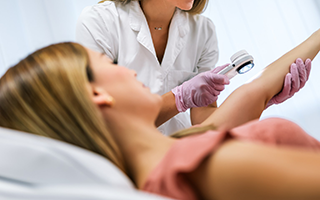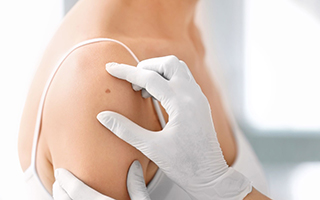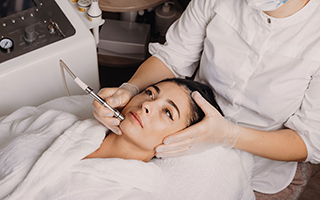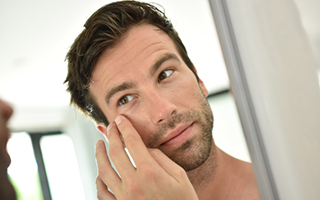Skin Cancer Evaluation and Treatment
Accurate Diagnosis, Care, and Removal for Cancerous Lesions in Bryn Mawr, Newtown Square, Philadelphia, and the Main Line
- Home
- Medical Dermatology
- SKIN CANCER
- Skin Cancer Evaluation and Treatment
Cancers that start in the skin are incredibly common around the world. Fortunately, these cancers are alsohighly treatable when diagnosed in their early stages. When a cancer has enough time to grow and spread, treatment becomes more difficult. Dermatologists encourage patients who have suspicious spots or growths on their skin to have them examined as soon as possible. Patients who have skin cancer exams and treatments at Bryn Mawr Skin & Cancer Institute can expect a correct diagnosis, as well the most advanced, individualized therapies.
Get customized, top-rated skin cancer evaluation and treatment at Bryn Mawr Skin & Cancer Institute. To schedule an appointment, Please BOOK ONLINE, call 610.525.5028, or Contact Us.
What Causes Skin Cancer?
Exposure to ultraviolet (UV) light from natural sunlight or artificial sources,such as tanning beds and sun lamps, is the primary cause of skin cancer. Sun damage is cumulative, and UV rays damage the DNA of the cells when they penetrate the skin, increasing the risk of mutations that result in cancer.
Cancerous growths tend to form on areas that are most frequently exposed to sunlight—such as the scalp, face, lips, ears, neck, chest, arms, legs, and hands—but they can also develop on “double covered” areas(e.g. under a bra or underwear).
There are three main types of cancers that affect the skin: basal cell and squamous cell carcinoma (which develop in the upper layers of the skin) and melanoma (which is less common, but a more dangerous form of skin cancer).

Meet Our Dermatologists &
Certified Physician Assistants
Our board-certified dermatologists & PA-Cs are dedicated to detecting and treating skin cancers. We treat the full spectrum of skin diseases. Our Mohs and Plastic Surgery practices are integrated, and offer patients the most advanced skin cancer treatment, delivering superior outcomes.
How Is Skin Evaluated?
A dermatologist will go over your skin closely, looking for suspicious lesions and other potential signs of cancer. It is important to not wear nail polish, as skin cancers can develop beneath fingernails and toenails. Any unusual spots or bumps may be further tested with a biopsy.
It is important to pay attention to all lesions on your skin and be aware of your moles throughout the year. You or a close partner will likely be the first to notice something unusual. You can also alert you dermatologist to any changing or symptomatic lesions at the time of your skin cancer exam.
Patients who have the highest risk of skin cancer include those who:
- Have had a previous form of non-melanoma skin cancer,or melanoma
- Have family members who have had it
- Are blond or red haired and have light-colored eyes
- Naturally have very pale skin that burns, freckles, or reddens easily in sunlight
- Have a large number of moles or freckles
- Have a typical moles
- Are taking a medication that weakens their immune system
- Have another illness that weakens their immune system
- Are older adults
Which Treatment Options Are Available for Skin Cancer?
The results of a biopsy will reveal what type of cancer is present. Additional testing will be guided by this result and may include X-rays, CT scans, or PET scans.
Treatments typically involve the surgical removal of cancerous cells along with a small amount of normal, healthy skin surrounding them. The most suitable treatment depends on the size, location, and type of cancer present. Surgery and cryotherapy are twoof the most common solutions for non-melanoma cancers. Melanoma is removed surgically.
How to Protect Your Skin
Although certain forms of cancer may not be preventable, patients can lower their risk significantly by reducing their exposure to UV light. Wear SPF 30 broad-spectrum, water-resistant sunscreen all over your face and body, and remember tore-apply every two hours when outdoors—or more often if it is washing off due to pool or ocean water, or sweat.
Wear ultraviolet protective clothing, hats,and sunglasses. It’s also critical to minimize the amount of time you spend exposed to sunlight during peak hours, and to seek shade as much as possible. Refrain from using artificial sources of sunlight such as tanning beds and sun lamps.
Patients on the Main Line, Bryn Mawr, Newtown Square, and Philadelphia can receive comprehensive skin cancer evaluation and treatment from Bryn Mawr Skin & Cancer Institute. To schedule an appointment, Please BOOK ONLINE, call 610.525.5028, or Contact Us.

























